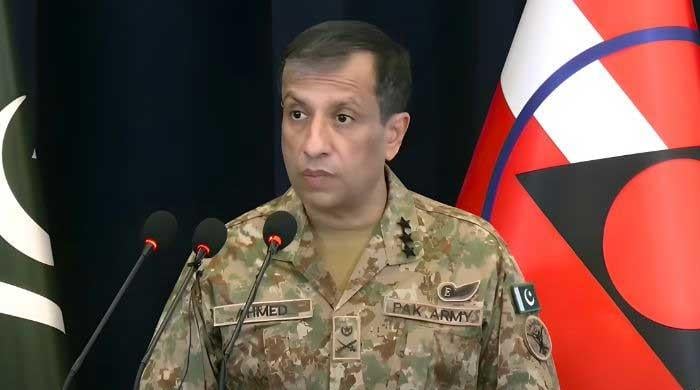Director-General (DG) Inter-Services Public Relations (ISPR) Lieutenant General Ahmed Sharif Chaudhry has issued a stern warning to terrorists’ facilitators, saying that “political-criminal nexus” is responsible for the surge in militant incidents in the province.
“In 2014, after the incident of Army public school tragedy, the government of that time and the military began rooting out the menace of terrorism from Khyber Pakhtunkhwa,” said the DG ISPR.
Later on, the ISPR chief said that terrorists and their facilitators were given space in KP under the “well thought out plot”.
The governance and public welfare were deliberately affected, Lt Gen Chaudhry said.
“We must all unite to eliminate this cancer of terrorism once and for all,” he said, adding that Pakistan’s security forces and the people of KP had fought with unmatched bravery.
He reaffirmed the armed forces’ resolve to uproot terrorism “in all its forms and manifestations”, paying tribute to the security personnel and civilians who laid down their lives in the line of duty.
Record number of operations, heavy sacrifices
Lt Gen Chaudhry said that in 2024, more than 14,535 intelligence-based operations (IBOs) were conducted in KP, while 10,115 had already been carried out in 2025, averaging around 40 operations per day.
He said 769 terrorists were killed in 2024, while 917 were eliminated so far this year.
“In 2024, 577 Pakistanis were martyred, including 140 police personnel, 272 soldiers and FC officials, and 165 civilians,” he noted.
“In 2025, 516 lives have been lost — 311 military personnel, 73 police officials, and 132 civilians.”
The DG ISPR said the number of terrorists killed this year was the highest in a decade, adding that the increasing intensity of operations showed “the resilience of Pakistan’s law enforcement apparatus”.
He said: “It is an unfortunate reality that, under a calculated design, space was given to terrorists and their facilitators. The people of KP are now paying the price with their blood.”
The DG ISPR said 161 Afghan nationals were killed in terrorist incidents over the past two years, while 135 were neutralised while infiltrating across the border, and nearly 30 suicide bombers had Afghan citizenship.
Speaking on the repatriation of Afghan refugees, the military’s spokesperson said that Pakistan has hosted “Afghan brothers” for decades, but now the state decided to send them back.
“Unfortunately, politics is being done on this issue, and a narrative is being created around it.”
“A fake and fabricated narrative is being built against the ongoing operations against terrorism and martyrs of Pakistan Army and police are being ridiculed,” he noted, while describing it as a “nexus between political and criminal elements”.
“A person or group that is facilitating Fitna al-Khawarij has three choices — one is to hand over these terrorists to the state, the second is to join hands with state institutions in anti-terror operations.”
“If both of these options do not work, then they [the facilitators] should be ready for action by the state,” he added.
“This status quo will not work anymore.”
The message, he said, was unambiguous: political or criminal patrons of terrorism would not be tolerated.
Responding to a question on the purported airstrikes in Afghanistan’s Kabul, the DG ISPR neither admitted nor rejected targeting Tehreek-e-Taliban Pakistan (TTP) chief Noor Wali Mehsud.
“We are doing and we will continue to do whatever is necessary for the protection of our civilians’ lives and properties as well as the territorial integrity of Pakistan,” he replied.
Reaffirming the nation’s resolve to eradicate terrorism, the ISPR chief paid tribute to the people of KP for their unwavering courage in the fight against militancy.
“The people of KP are bravely fighting terrorism,” he said, adding that “the brave sons of the soil have written a glorious history of sacrifice and valour with their blood.”
Renewing the commitment to uproot terrorism, he said that Pakistan’s security forces, along with the nation, remain determined to ensure lasting peace and stability across the country.
Lt Gen Chaudhry said that following the APS attack, the National Action Plan was devised with the approval of all stakeholders, adding that the plan has not been implemented in letter and spirit.
Providing a comprehensive insight into the menace of terrorism, he said that non-implementation of the NAP, politics on terrorism, use of Afghanistan as a base of operations by Indian proxies, terrorists possessing US weapons, and the terror-crime nexus were the five key factors behind it.
Shedding light on the governance issue, the military’s spokesperson noted that governance gaps in KP were being filled by the “blood of security personnel” and that the NAP, devised with the approval of all stakeholders, has not been implemented in letter and spirit.
He also criticised the “political thought” advocating for negotiations with terrorists instead of operations.
“It is absolutely clear who is building the narrative for dialogues with those who killed our children and played football with their heads,” he remarked.
Highlighting the judicial and legal lacunas and shortcomings in prosecuting the terrorists, he said that as of August 2025, not a single terrorist had been convicted, with 34 cases pending, and the number of CTD cases less than three years old stands at 2,878, whereas the number of pending cases more than three years old was 1,706.
It was decided in 2014 and 2021, and the CTD had to be strengthened to root out terrorism in KP.
“Currently, the operational strength of the KP CTD is 3,200 […] is it enough?”
This is a developing story and is being updated with more details.


